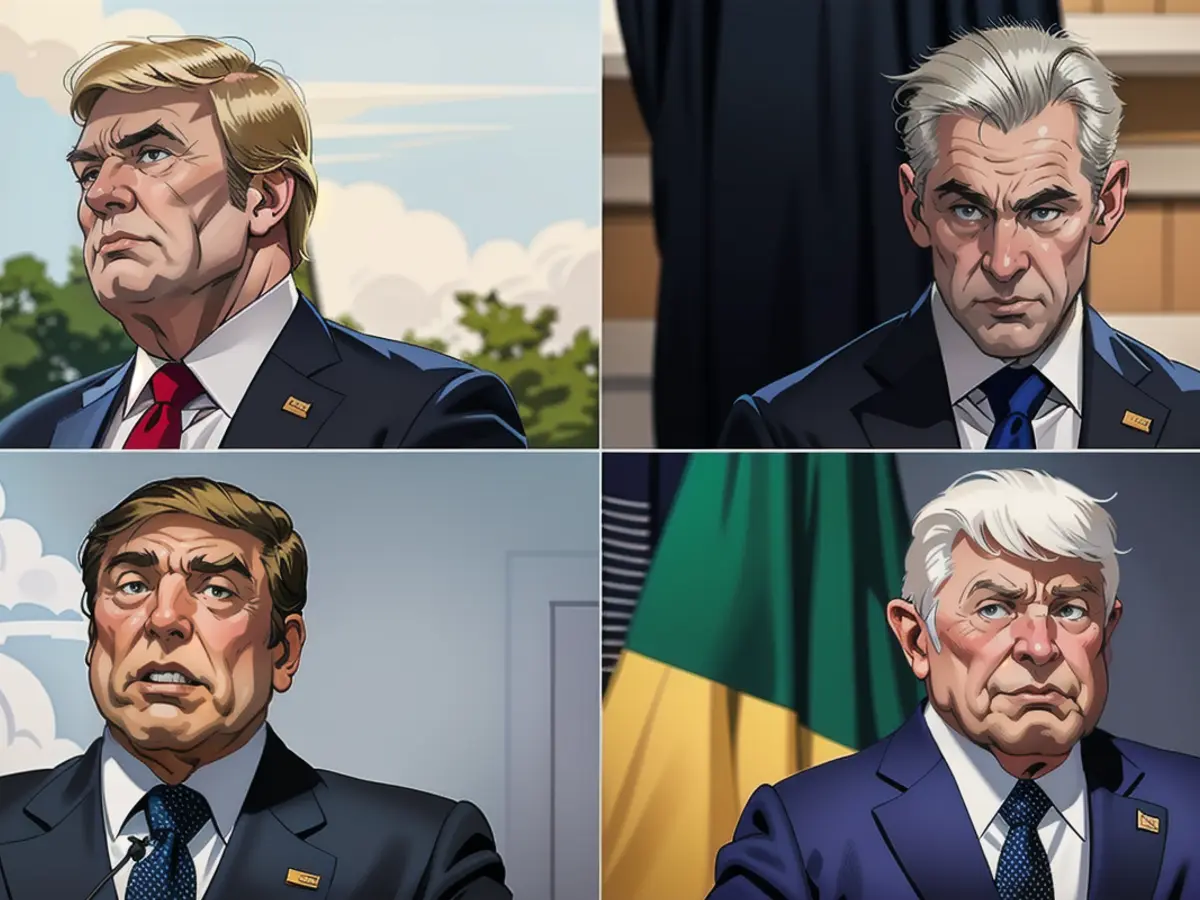Viewpoint: Trump joins an unwanted group - those who have been convicted of criminal offenses.
Donald Trump, a former US President, is now a convicted felon. This is an exceptional case in American history.
Across the globe, the criminal trials and convictions of ex-leaders have taken place in both stable democracies and former dictatorships. Some of these stories provide insight into Trump's situation. They illustrate how a former ruler may be down after a criminal trial, but not necessarily finished. The track record of these leaders demonstrates the riskiness of guessing what will happen.
There are countless instances of this happening. For example, in Argentina in 2022, Cristina Fernández de Kirchner, previously the Vice President and President, was found guilty of corruption charges related to road contracts. Although she is expected to avoid jail time due to her age, her conviction has impacted her significantly.
Another instance occurred in February, when former Austrian Chancellor Sebastian Kurz got an eight-month suspended sentence for lying to Parliament. His swift decline is a surprise for a prodigy in European conservatism. He promised to contest the verdict. Additionally, in 2017, former South Korean President Park Geun-hye faced an impeachment and criminal conviction in an odd power-abuse scandal involving a friend and advisor.
The differences in these contexts are significant. However, we can ask some common questions about their political outcomes, their supporters' reactions, and how their countries' justice systems react.
Freedom House, a Washington-based think tank, monitors freedom and democracy worldwide. It revealed that 43% of the nations it regards as "free" have indicted current or former leaders since 2000. This statistic shows that prosecuting a national leader is not unusual in democratic countries. "It's crucial for people to understand this, as some argue that the US is transforming into a backwater or an undemocratic country. In reality, this process is functioning in many other countries," said Nicole Bibbins Sedaca, the Executive Vice President at Freedom House, in an interview with CNN.

Three examples — France, Italy, and Brazil — highlight these concepts particularly well.
In one of the world's oldest established democracies, France, ex-President Nicolas Sarkozy was found guilty of illegal campaign financing in 2021. Consequently, he received a one-year sentence, half of which was suspended. He served the remaining half of his time while wearing an ankle bracelet under house arrest.
According to Bibbins Sedaca, France is a "great example" of how prosecuting a former head of state can go well. France has prosecuted both its former presidents and prime ministers for corruption in the last 15 years, which includes Sarkozy's conviction for undeclared campaign financing in 2011 for 21 "ghost jobs" during his time as Paris's mayor. Although some expressed concerns about the impartiality of the system and its potential for damaging it, the public's trust in France's legal system remained unchanged. Sarkozy is slated to face trial in 2023 for allegedly accepting illicit funds from former Libyan leader Moammar Gaddhafi for his 2007 presidential campaign.
In Italy, the flamboyant media magnate, Silvio Berlusconi, faced numerous trials. The Stormy Daniels scandal might seem unusual, but he was accused of paying 24 individuals (mostly young guests at his "Bunga Bunga" parties) to give false testimony in a previous trial. He was convicted in 2013 of sex crimes and sentenced to seven years in prison. One year later, he was acquitted on appeal in the underage prostitution case. In 2013, he acquired an additional one-year sentence after being found guilty of bribing a witness. As he was over 70, Berlusconi served his time by performing community service at an Alzheimer's hospice near Milan.
Despite this, Berlusconi's position on Italy's political scene remained powerful. He rallied and regained his standing on the right, with his Forza Italia party experiencing a resurgence in 2017's mayoral elections. In 2018's national elections, he helped lead his party to a 14% victory, forming a coalition with the populist Five Star Movement.

These examples reveal that a former leader's conviction isn't always detrimental to their political future. However, how each situation is handled reveals much about a nation's political environment and its people's reactions to their justice system.
On the Italian right, Berlusconi was gradually being eclipsed by Matteo Salvini and later Giorgia Meloni. However, during the 2022 election that propelled Meloni to power, Berlusconi was still a significant player in the coalition she led. Berlusconi, who passed away last year at the age of 86, was a prominent figure within her coalition.
In Brazil, another parallel to Trump emerges, but with some significant differences. After serving as president from 2003 to 2011, Luiz Inacio Lula da Silva (referred to as Lula) was arrested in connection with the so-called Lava Jato (or "car wash") scandal - a series of kickback and bribery investigations that caused a stir throughout Latin America.
A scandal erupted involving the state oil company Petrobras, and Lula was convicted of corruption and money laundering in 2017. He served 580 days in prison, with supporters camping outside his cell. Lula was released in 2019, and in 2021, his convictions were annulled due to a jurisdictional issue.
It was also discovered that the judge in Lula's case had exchanged text messages with prosecutors. After that judge later became justice minister under conservative President Jair Bolsonaro, Lula was a free man again. He contested the presidency against Bolsonaro in 2022 and won.

According to Oliver Stuenkel, a professor at the School of International Relations at Fundacão Getulio Vargas in São Paulo, some parts of Brazilian society saw Lula's conviction as a positive event that highlighted the impartiality of the law. However, others viewed it as politically motivated and biased against the left. "And then there were those of Lula's hardcore supporters who instantly said it was completely politically motivated," said Stuenkel in an interview with CNN.
Political bias is viewed as a drawback in Brazil's judicial system, according to Stuenkel. While some supporters of Lula's initial conviction thought the later annulment was politically motivated, the conviction didn't have any negative impact on Lula during his 2022 presidential campaign against Bolsonaro because concerns about the threat Bolsonaro posed to Brazilian democracy outweighed fears of Lula's return and potential corruption.
Trump portrays himself as a political outsider, insisting that the system is the problem, not him. However, opinions on whether the public will agree to this vary greatly.
After the Manhattan verdict, initial polling by Reuters/Ipsos found that 14% of Republicans and 58% of independents stated that they would not vote for Trump if he had been convicted of a felony. Nonetheless, Ariel Edwards-Levy of CNN's polling unit posits that these types of survey questions are difficult to interpret, often overestimating potential shifts in public opinion. Partisan views on the significance and legitimacy of the verdict differed.
Trump could potentially follow in Berlusconi's footsteps, seemingly invincible to scandal. Alternatively, his case could resemble that of Brazil's Lula, with voter perceptions of the conviction depending on their degree of partisanship and personal connection to him. Or he could be more like Sarkozy and Chirac, whose cases would only be resolved based on the rule of law.

Despite the potential damage a criminal conviction may cause to Trump's political standing, we can never truly predict how things will unfold. Previously, former world leaders have managed to stage triumphant comebacks, even after serving time in prison. The unwavering loyalty of his supporters seems to justify their belief that Trump stands for them, outweighing any of his questionable actions, misleading comments, or the disorganization within his first administration.
The public's faith in the US judicial system, as noted by Bibbins Sedaca from Freedom House, will heavily depend on how other political figures speak about the verdict. An opportunity exists for political leaders "across the spectrum" to reaffirm that "[w]e live in democracies" and that the law applies equally to everyone, highlighting the essential social contract. It's up to these leaders to determine how they will address this issue.
Read also:
In the context of former leaders facing criminal trials and convictions, some political analysts might draw parallels between Donald Trump's situation and that of Luiz Inacio Lula da Silva in Brazil.
Furthermore, independent voters and Republicans may have differing opinions on whether a criminal conviction would affect their voting choices for Trump in future elections.







